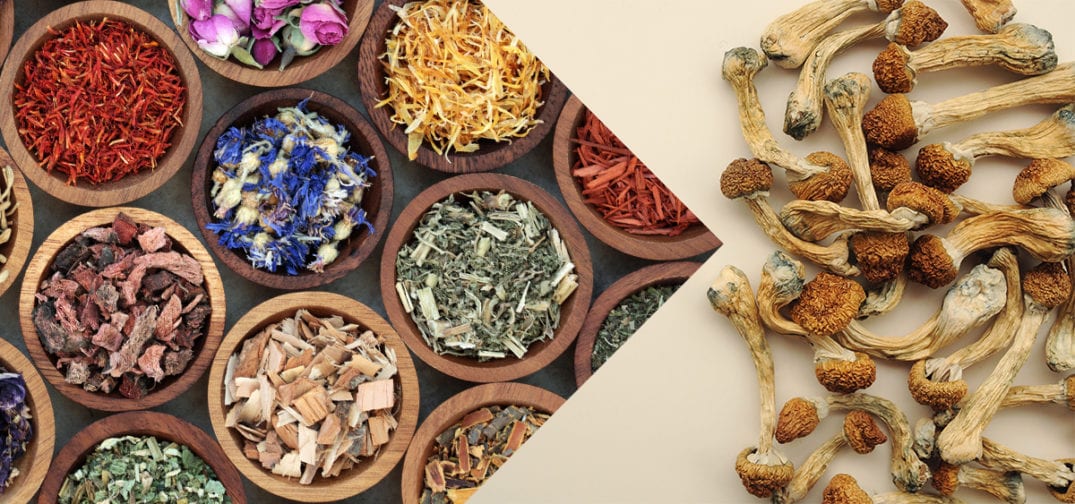Adaptogens are medicinal plants and mushrooms that are experiencing a resurgence in global wellness trends and among Western herbalists. The origin of adaptogens outdates the moniker itself, however, as the name refers to natural medicines that were selected from a variety of ancient human healing practices—but by removing these ancient medicines from their original practice, most participants in the modern adaptogen free-for-all are devaluing the plants’ efficacy and erasing the modality that was long used to diagnose and prescribe their use.
Today, a growing number of brands in the CBD and now psychedelics space are combining their products with adaptogens but frequently without consideration or respect for their cultural origins and/or purpose.
What are adaptogens?
“Adaptogen” is a Western term used to describe plants and mushrooms that affect human physiology in different ways, typically with historical use as ancient healing modalities. The term was coined by Dr. Nikolai Lazarev in 1947 while researching stress resistance to serve the Soviet Union during the Cold War. He was initially researching chemicals before a colleague directed his studies towards plant medicines. His colleague, Israel I. Brekhman, had been inspired by the Nanai hunters who ate Schisandra berries to reduce hunger, thirst, and exhaustion.
Their research led the Soviet Ministry of Health to declare eleuthero, also known as Ci wu jia in Traditional Chinese Medicine, an official herbal medicine in 1962. This declaration marked the beginning of a now-ubiquitous trend whereby Western herbal medicine has touted the benefits of “new” medicinal plants or “superfoods” while ignoring their historical context — while in truth, these ancient medicines were used in indigenous Asian and First Nations cultures for thousands of years before they were “discovered” by the West.
Dr. Lazarev and Brekham completed over 1,000 clinical studies and tested their adaptogenic medicines on Russian Olympians and cosmonauts. They identified adaptogens as plants and mushrooms that carry the following three qualities:
- Nontoxic, causing minimal physical or mental side effects
- Producing nonspecific responses in the body including physical, chemical, and biological agents
- Has a normalizing influence on the recipient’s physiology
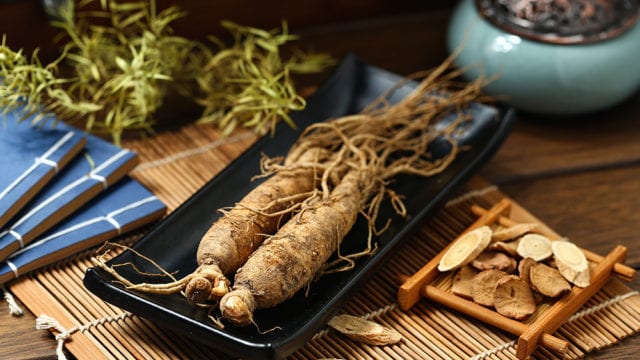
David Winston, RH believes that there aren’t as many official adaptogens as people think. His categorizations encompass nine well-researched adaptogens including Asian ginseng, American ginseng, ashwagandha, eleuthero, Schisandra, Rhodiola, shilajit, and cordyceps. According to Winston, probable adaptogens include holy basil, suo yang, tienqi ginseng, Shatavari, and Morinda. Meanwhile, prince seng, reishi, codonopsis, Guduchi, crossvine, and eucommia are possible adaptogens—and amla, astragalus, maca, and goji berry are considered nutritive tonics.
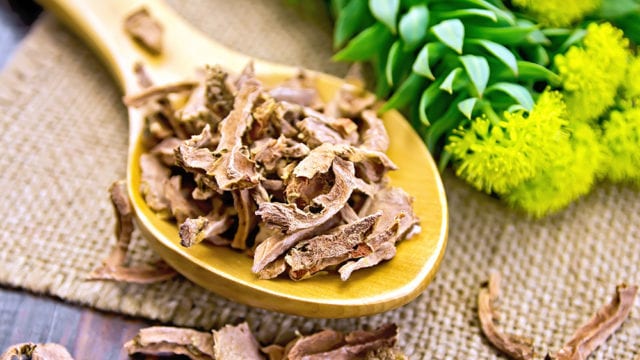
Adaptogens’ appropriation
Western medicine practitioners still don’t recognize the benefits of adaptogens, citing difficulty in discerning these medicines from tonics, anabolic agents, antioxidants, and immune system modulators. But for practitioners of Traditional Chinese Medicine (TCM) and Ayurvedic medicine, they represent established and proven healing methodologies used in their practices for generations.
Meanwhile, many North Americans have started using the wide breadth of adaptogens as spot treatments without learning the holistic approach to using these herbs, fruits, and mushrooms. However, using one adaptogen without the correct understanding could throw one’s system more out of whack. For example, in the Indian practice of Ayurveda, one’s doshas—an internal energy or essence—are taken into account before a practitioner dictates which plants will be suitable to bring balance back to the patient. In that practice, each person is considered to carry a unique combination of doshas, generally with one dominant dosha. A skilled Ayurvedic practitioner will note these imbalances and prescribe a diet and supplements, including herbs and mushrooms, in order to bring more balance to that patient’s life. Seeing the ancient remedies as a quick cure-all not only disrespects that lineage, it could ultimately do more harm than good.
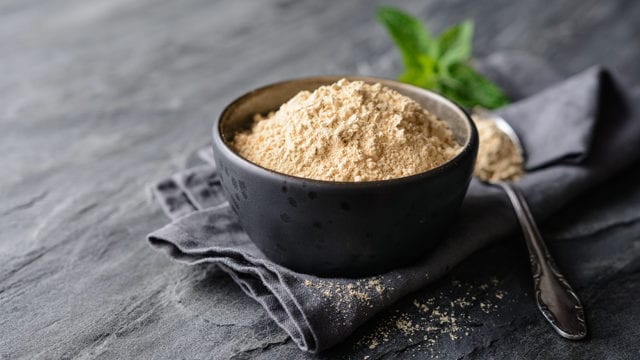
Adding to this confusion, brands in the CBD industry have lately turned to adaptogens to augment goods including pure CBD oils, capsules, and other products.
Adaptogens in CBD
CBD bands frequently include adaptogenic herbs and other plants in their tinctures, capsules, and product formulations. This is meant to influence the CBD’s effects, such as by promoting sleep or creativity.
Many use CBD as a stress reliever, so the connection between adaptogens and CBD does make some anecdotal sense. Examples may include an infused oil made with reishi mushroom to aid the immune system, a CBD capsule with ginkgo and bacopa monnieri that is supposed to improve mental clarity, or truffles with ashwagandha and maca meant to boost one’s stamina. Both adaptogens and CBD are believed to promote homeostasis, which draws another natural connection between the two products.
However, without the help of a practitioner, these products may not be as helpful as the creators hope—and worse, their misuse could cause actual harm.
The future of psychedelics, through the lens of adaptogens
Some companies have started to use adaptogenic mushrooms and CBD in combination, seemingly in preparation for a regulated psilocybin market. Consider the January 2021 launch of Caps by Cookies: their products combine cannabinoids, terpenes, and medicinal mushrooms in various combinations. This recipe is aligned with the usual adaptogenic CBD brands but the branding features mushroom cartoons that look nothing like the lion’s mane, reishi, or cordyceps used in the formulations. Instead, they appear as blue-capped psilocybin mushrooms bent into the word ‘Caps.’
Caps by Cookies available now… in { Clarity } and { Bed Head } !!! 🍄✨🌱 at https://t.co/KSIHH51W0F ! pic.twitter.com/WYVJP5jYKj
— Cookies 🍪 (@cookiesglobal) January 14, 2021
Caps itself is a common term in the psychedelic community, as many trippers believe the most psychoactive qualities are found in this part of the shrooms. This choice of branding begs the question: are they positioning to capitalize on the slow decriminalization and eventual regulation of psilocybin? If so, they aren’t the only corporation that would be posturing for psychedelic marketing or even patenting.
In February 2021, a startup patented the combination of cannabis and psilocybin mushrooms to treat psychological disorders. The startup, CaaMTech, has filed 110 psychedelic patents since 2017 but this was the first to be approved. When the podcaster and author Tim Ferriss tweeted concerns about psychedelic patents, that discourse led to a telling Vice article exploring the possible dangers and inevitable greed that could shape the future of psychedelic medicine.
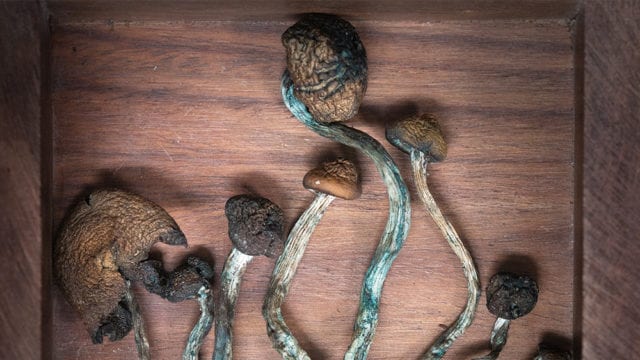
Like adaptogens, psilocybin was used by indigenous people long before the rise of Western medicine. The treatment’s patenting and further colonization may lead to the same erasure of ancient knowledge that occurred in the Soviet Union when Dr. Lazarev equated all traditional healing herbs under the same moniker. Ignoring the established work of predecessors in the name of Western science doesn’t help the cause of medicinal research or the people it is meant to serve. And unfortunately, if the adoption of these substances by cannabis culture is any hint, the same fate likely awaits future psychedelic medicines.
Get daily cannabis business news updates. Subscribe
End
